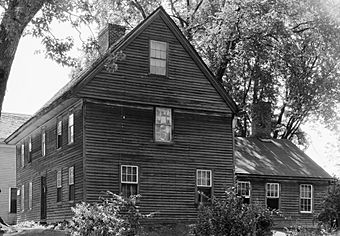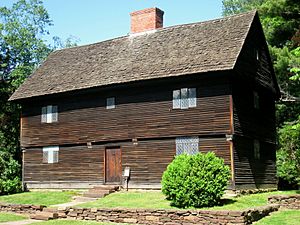Buttolph–Williams House facts for kids
|
Buttolph–Williams House
|
|
|
U.S. Historic district
Contributing property |
|

HABS photo of the house in 1938, prior to its restoration
|
|
| Location | 249 Broad St., Wethersfield, Connecticut |
|---|---|
| Area | 2 acres (0.81 ha) |
| Built | 1711 |
| Architectural style | Colonial |
| Part of | Old Wethersfield Historic District (ID70000719) |
| NRHP reference No. | 68000048 |
Quick facts for kids Significant dates |
|
| Added to NRHP | November 24, 1968 |
| Designated NHL | November 24, 1968 |
| Designated CP | December 29, 1970 |
The Buttolph–Williams House is a very old house in Wethersfield, Connecticut. It's located at 249 Broad Street. This special house was built way back in 1711, making it one of the oldest homes still standing in the town! Today, it's a historic house museum. This means you can visit it to learn about life long ago.
The house is owned by Connecticut Landmarks, a group that helps protect old buildings. You can usually take tours there from May to October. In 1968, the Buttolph–Williams House was named a National Historic Landmark. This is a big honor! It means the house is a super important example of early American building styles.
Contents
Exploring the Buttolph–Williams House
The Buttolph–Williams House is a two-and-a-half-story building. It is made of timber, which means it has a strong wooden frame. The roof is steep and slopes down on the sides. There is a large chimney right in the middle of the house.
A smaller, one-and-a-half-story part of the house sticks out from the back. It also has its own chimney. The main front door is simple and sits in the middle of the house.
Windows and Walls
The windows on the front of the house are special. They have diamond-shaped panes of glass. These windows were rebuilt to look exactly like the original ones from when the house was first built.
The top floor of the house hangs out a little bit over the bottom floor. This was a popular style back then. It was mostly for decoration, not for how the house was built. The outside walls are covered with wooden siding. This siding was made recently using old methods from the 1700s.
Inside the Historic Home
The inside of the house has also been carefully restored. This means it was fixed up to look just like it did when it was new. Inside, you can see furniture and other items that would have been used by families in the early 1700s. It's like stepping back in time!
History of the Buttolph–Williams House
For a long time, people thought this house was built between 1692 and 1698. But newer research shows it was actually built around 1711.
In 1947, the house got a careful restoration. An architect named Frederick C. Palmer led this project. They made sure to keep as much of the original building material as possible. The house first opened as a museum in 1951.
Today, the Webb-Deane-Stevens Museum helps run the Buttolph–Williams House. However, Connecticut Landmarks still owns the property.
A Book Connection
The Buttolph–Williams House is even famous in a book! It plays a part in the book The Witch of Blackbird Pond. This book was written by Elizabeth George Speare and won the Newbery Medal. The Newbery Medal is a very important award for children's books.
National Recognition
Because of its importance, the house was named a National Historic Landmark in 1968. It was also added to the National Register of Historic Places in the same year. This helps make sure the house is protected for future generations to enjoy.
Other Historic Places to Visit
Connecticut Landmarks takes care of many other historic house museums. If you enjoy visiting the Buttolph–Williams House, you might like these too:
 | John T. Biggers |
 | Thomas Blackshear |
 | Mark Bradford |
 | Beverly Buchanan |




